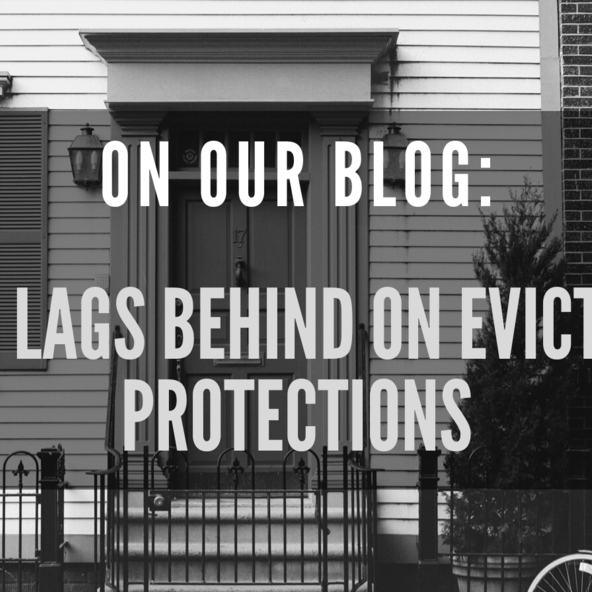
Earlier this week, the Eviction Lab at Princeton University, in partnership with Columbia Law School, issued a policy scorecard for all 50 states and the District of Columbia on emergency protections adopted to protect tenants facing eviction during the COVID-19 pandemic. DC currently ranks 19 out of 51 jurisdictions evaluated, lagging behind many states.
A major gap in the District’s response so far is the failure to stop new eviction cases from being filed. Since March 16, when the D.C. Superior Court largely shut down, landlords in DC have filed nearly 1,000 new eviction complaints. Pennsylvania’s Regional Housing Legal Services has created a national map and database illustrating each state’s response to the five stages in the eviction process:
1. Landlord serves tenant with a notice to quit,
2. Landlord files new eviction case against tenant,
3. Court holds hearing on eviction case,
4. Court enters judgment against tenant,
5. Law enforcement oversees physical eviction of tenant.
In the District, emergency legislation passed by the Council on March 17 stopped actual physical evictions (#5) during the public health emergency, and the D.C. Superior Court has stopped all hearings and the entry of judgments (#3 and #4), but no action has been taken to stop new notices to quit (#1) and complaints (#2).
Meanwhile, thirteen states have stopped notices to quit and sixteen states have stopped eviction filings. States ahead of DC on one or both of these measures include Connecticut, Delaware, Hawaii, Indiana, Iowa, Kansas, Kentucky, Massachusetts, Michigan, Minnesota, Nevada, New Hampshire, New York, Oregon, Pennsylvania, Rhode Island, South Carolina, Washington, and Wisconsin.
When the Council reconvenes on May 5, a top priority should be passing legislation to stop all new eviction filings during the public health emergency and for 30 days after. Temporarily stopping new eviction case filings will allow tenants time to try to get financial supports in place and possibly avoid any case being filed at all. Unemployment insurance and federal stimulus checks are still rolling out, and discussions are underway at both the local and national level to expand emergency rental assistance for tenants, but these efforts will take time.
For low-income tenants who already struggle to find stable housing, an eviction case filing can do significant damage, even if the case ultimately is dismissed or settled. Just this week, attorneys at Legal Aid have been in touch with tenants who are being denied housing opportunities because of eviction cases on their records. By pausing eviction filings, the Council will provide tenants with a fighting chance to avoid displacement and stay out of court.
We also know that many tenants will need financial supports to stay in their homes. As the Mayor and Council look ahead in the coming weeks to the Fiscal Year 2021 budget and beyond, Legal Aid remains focused on ensuring that rent relief and rental assistance become part of the District’s response to the COVID-19 pandemic.




